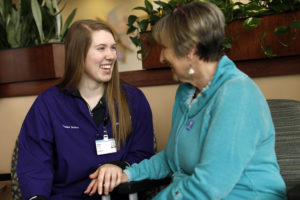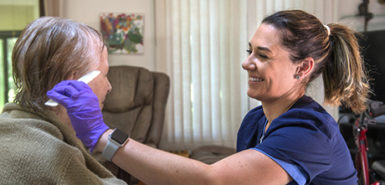
Volunteering was once described as “chicken soup for the soul” in a popular book series, but according to a growing body of research, it likely also has positive effects on your heart and mind, too.
For example, people who volunteer are more likely to use preventive medicine services, including 47 percent more likely to get cholesterol checks and 30 percent more likely to get flu shots, according to Harvard Medical School.
Other research found people who volunteered at least 200 hours per year were less likely to develop high blood pressure.
Some of these results are likely “selection bias,” said Thomas Boyden, MD, who leads the Spectrum Health Medical Group Preventive Cardiology program.
“If you’re a healthy motivated individual, and you have time to volunteer and take care of others, you’re likely motivated and organized enough to also take care of yourself,” Dr. Boyden said.
But the science indicates there are also tangible health benefits to volunteering.
‘Sense of purpose’
A pooled data analysis in Psychosomatic Medicine: Journal of Biobehavioral Medicine, which analyzed 10 previous studies, showed people who have a “sense of purpose” suffer less cardiovascular disease and have lower risk of death.
Volunteering can give people that focus, said Kim Francis, who oversees more than 1000 volunteers as manager of volunteer services for Spectrum Health.
“A lot of volunteers talk about how they feel about volunteering—they leave feeling a sense of purpose, that they were productive and positively impacted other people,” Francis said.
“I’ve seen studies that people who are happy and fulfilled and less stressed, they have many fewer health problems. … Volunteering is a whole package: Helping people, helping yourself.”
Pedometers and perspective
In addition to giving people a sense of purpose, volunteering often gets people moving and socializing, which both have positive health effects, studies show.
“A lot of older people like to do greeting and way-finding, and they count their steps,” Francis said. “They get thousands of steps, which can help with weight management, weight loss, strength.”
Spectrum Health, in particular, has “quite a few” retired volunteers, she said, who use “pedometers or Fitbits, and are always checking their steps. They come in with comfy tennies and help people for hours.”
In addition to walking, that social engagement—whether helping people find the right section of the hospital or parking lot, or playing with and reading to sick children—has other benefits, too. Psychology Today noted social engagement is associated with a stronger immune system for older adults, which can improve health and reduce risk of death.
Lastly, volunteering improves mental health, experts say, which is strongly linked to physical health. Depression has been linked to a 67 percent increased risk of heart disease and 50 percent increased risk of cancer, according to the Mental Health Foundation.
Volunteering gives people perspective and brings joy, which can ease depression and reduce stress.
“Helping people in stressful situations, seeing people in really dire situations like here at the hospital, gives you the perspective that other people are going through big things, so maybe what I’m going through isn’t so big or so bad,” Francis said.

 /a>
/a>
 /a>
/a>
 /a>
/a>
I loved this article! I am so looking forward to a time when I can do this.